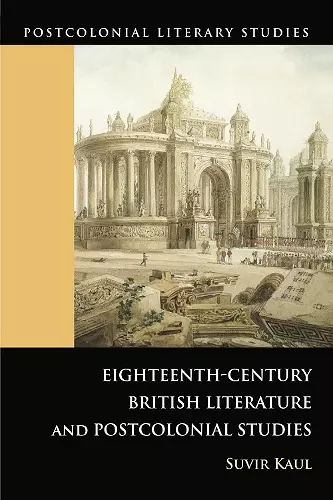Eighteenth-Century British Literature and Postcolonial Studies
Format:Paperback
Publisher:Edinburgh University Press
Published:25th Feb '09
Currently unavailable, and unfortunately no date known when it will be back

'This book convincingly challenges both the extremely short historical memory of most postcolonial work and the all-too-insularly English world still conjured by period specialists. Hogarthian whores and Grub Street hacks, coffee houses and fashionable pastimes, and the burgeoning of print culture all stand revealed as intimately bound to portents of plantation insurgency, agitation for abolition, and the vast fortunes produced by the labouring bodies of the poor, the colonized, and the enslaved. Eighteenth-century studies has never appeared in a more engaged and fascinating light.' Professor Donna Landry, University of Kent In this volume Suvir Kaul addresses the relations between literary culture, English commercial and colonial expansion, and the making of 'Great Britain' in the late seventeenth and eighteenth centuries. He argues that literary writing played a crucial role in generating the vocabulary of British nationalism, both in inter-national terms and in attempts to realign political and cultural relations between England, Scotland, and Ireland. The formal innovations and practices characteristic of eighteenth-century English literature were often responses to the worlds brought into view by travel writers, merchants, and colonists. Writers (even those suspicious of mercantile and colonial expansion) worked with a growing sense of a 'national literature' whose achievements would provide the cultural capital adequate to global imperial power, and would distinguish Great Britain for its twin success in 'arms and arts'. The book ranges from Davenant's theatre to Smollet's Roderick Random to Phillis Wheatley's poetry to trace the impact of empire on literary creativity. Key Features *An introduction to the impact of mercantilism and empire on the crafting of eighteenth-century British literature *Encourages students to examine the key formal innovations that define eighteenth-century British literary history as they were produced by writers who redefined their sense of home, nation and the world
This book addresses the relations between literary culture, English commercial and colonial expansion, and the making of 'Great Britain' in the late seventeenth and eighteenth centuries. This book convincingly challenges both the extremely short historical memory of most postcolonial work and the all too-insularly English world still conjured by period specialists. Hogarthian whores and Grub Street hacks, coffee houses and fashionable pastimes, and the burgeoning of print culture all stand revealed as intimately bound to portents of plantation insurgency, agitation for abolition, and the vast fortunes produced by the labouring bodies of the poor, the colonized, and the enslaved. Eighteenth-century studies has never appeared in a more engaged and fascinating light. -- Professor Donna Landry, University of Kent Kaul succeeds well in his project to situate literary production within the context of the international mercantile anxieties of nation and economy in the long eighteenth century... This is a very valuable and erudite work, short in length but rich in scope and content, beneficial for scholars, graduate students, and undergraduates alike, that serves as a good compendium of sources for further reading and research. The focus on the extratextual mercantile and colonialist phenomena can help dissuade readers from celebrating the meanings of literary texts and encourage them, instead, to reflect upon the forces, not readily evident, that produce those meanings. -- Thomas Paul Bonfiglio, University of Richmond College Literature This book convincingly challenges both the extremely short historical memory of most postcolonial work and the all too-insularly English world still conjured by period specialists. Hogarthian whores and Grub Street hacks, coffee houses and fashionable pastimes, and the burgeoning of print culture all stand revealed as intimately bound to portents of plantation insurgency, agitation for abolition, and the vast fortunes produced by the labouring bodies of the poor, the colonized, and the enslaved. Eighteenth-century studies has never appeared in a more engaged and fascinating light. Kaul succeeds well in his project to situate literary production within the context of the international mercantile anxieties of nation and economy in the long eighteenth century... This is a very valuable and erudite work, short in length but rich in scope and content, beneficial for scholars, graduate students, and undergraduates alike, that serves as a good compendium of sources for further reading and research. The focus on the extratextual mercantile and colonialist phenomena can help dissuade readers from celebrating the meanings of literary texts and encourage them, instead, to reflect upon the forces, not readily evident, that produce those meanings.
ISBN: 9780748634552
Dimensions: unknown
Weight: 315g
208 pages